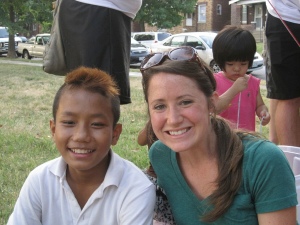If you were once a faithful follower of this blog, you will have noticed that my posts dropped off in February––about the time that I got engaged! Blogging took a back seat to wedding plans, visits with family, showers, registries, house/apartment searching and etc. But here I am, on the other side of marriage to my BEST FRIEND and I am ready to dive back in. On our honeymoon Mike (who blogs at (All of Grace ) encouraged me to start reading, reflecting and writing again. For both of us it is a time to slow down, process what we read, and be steeped in the Gospel. (In case you were wondering, the wedding was PERFECT and the sweetest representation of God’s covenant commitment to His bride, the church. Mike and I were so blessed by our friends and family that weekend and we love re-living all the memories.)
Our honeymoon was relaxing, rejuvenating and spiritually reviving. Much of what came out of that time for me was a renewed desire to read God’s Word and to be changed by the stories and parables in the Old and New Testaments. I read Madeleine L’Engle’s The Rock that is Higher: Story as Truth, and was excited and challenged by her perspective on story. As a counseling intern this year, I am especially interested in the stories that each of my client’s bring and how their lives fit into God’s cosmic plan for the redemption and reconciliation of all things. We have a tendency to look down on that which is fiction, that which is not literal fact, but we must remember that:
“Jesus taught by telling stories, parables, myths, and his stories were true, though not everybody could hear them. Jesus came to show us through his stories what it is to be human and what it is to be heroic and to understand heroes.” (p. 216)
As we read the stories of Daniel, of Ruth, of David, of Peter we can’t help but see our humanity reflected in them. Do we read these stories as mirrors that reveal what lies within our own hearts, or do we leave their stories on the page?
L’Engle says, “Story makes us more alive, more human, more courageous, more loving. Why does anybody tell a story? It does indeed have something to do with faith, faith that the universe has meaning, that our little human lives are not irrelevant, that what we choose to say or do matters, matters cosmically.” (p.220)
Over the coming months, I hope to unpack what I am learning about God’s epic narrative and the small and big ways I see it unfolding in and around me.

